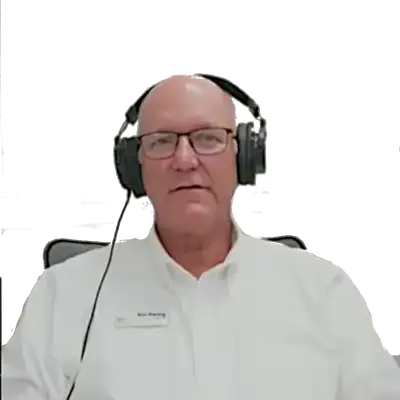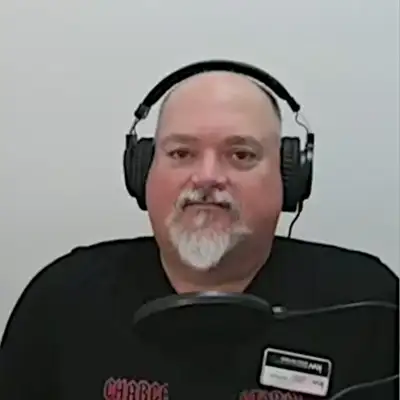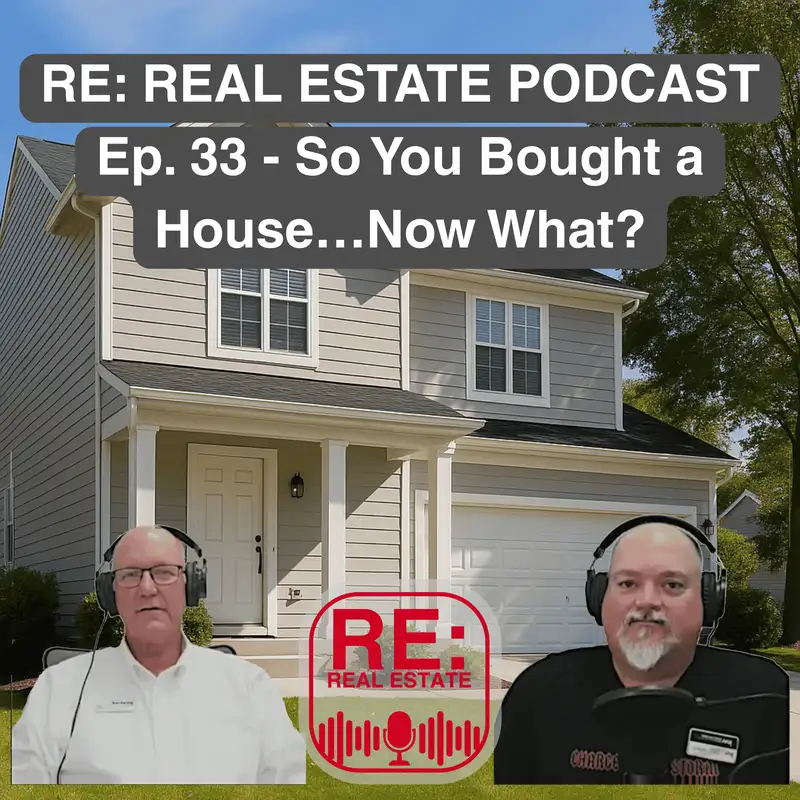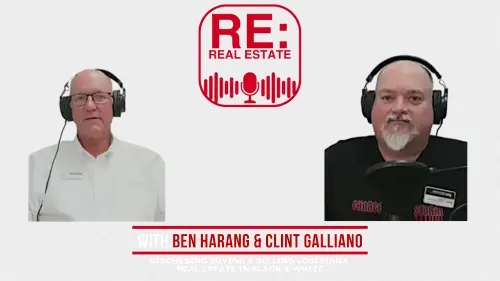Ep. 33 - So You Bought a House...Now What?
Clint C. Galliano, REALTOR® (00:25)
Welcome to the RE Real Estate Podcast. I'm one of the hosts, Clint Galliano, and with me is my co-host, Ben Harang Hey, Ben. What you doing, man?
Ben Harang, REALTOR® (00:37)
Clint, good afternoon.
How you doing, man? I'm sorry. How you doing today?
Clint C. Galliano, REALTOR® (00:42)
I'm doing wonderful. How you doing?
Ben Harang, REALTOR® (00:45)
Good. I'm doing terrific, man. It's, sun shining outside. It's a little warm, but not too hot. life is good. Life is good.
Clint C. Galliano, REALTOR® (00:52)
Awesome. So I'll do the honors on this episode. We'll put it up front instead of at the end. If you get any benefit from what we're talking about, because we think it's good content, which is why we're doing it, like, subscribe, share, tell all your friends about it. Send them to rerealestatepodcast.com. You can listen to the audio or watch the videos. You can even ask questions.
All right, Ben, what are we talking about today?
Ben Harang, REALTOR® (01:20)
All right. We're going to take it a little further than buying and selling a house. We're going to take it into, so you bought a house. What now? Ruh-Roh Look out what you asked for. You might get it. Yeah. Yeah. you know, when you, when you buy the house, there's a , it's euphoric, Hopefully it's exciting. It's something you want to do. and then the reality kind of sets in not that that's bad.
But there is a reality of, um, of owning a house is a, is a difference between being a tenant and an owner. Uh, if you're a tenant, you have a landlord to call when the AC doesn't, doesn't cool or the water heater doesn't heat the water or, um, something happens with the roof. When, um, when you own it, you can kind of go look in the mirror and call that guy, a woman in the mirror that you're looking at and say, we need to do something.
and then you try to figure it out.
You know, just, just a couple of things you buy the house, they give you the keys. You take the obligatory social media picture. get blasted all over social media. everybody in world knows you bought a house. Everybody's excited. Go home and change the locks or rekey the house. cause you don't know where that key has been. If anybody's ever lost possession of it, a duplicate could have been made and.
Just it's too easy to stop that. And today with the smart key, Kwikset locks and Schlage you can probably rekey them without changing the lock in like 15 seconds, rekey the house or rekey each lock. So that's one thing. make sure you get the utilities transferred. That should be done. Hopefully prior to the closing effective with the closing. Sometimes they require the.
cash sale to prove that you own it, to put the utilities in your name. So have a conversation with the seller and just, you don't want the utilities turned off. It's a pain in the neck to get them turned back on. So, so communicate that.
And then the homestead exemption, um, people that don't own a house, don't understand it. You might hear about it in the news when they want to increase it, decrease it, do away with it, whatever they think they want to do. I don't think it's changed in my lifetime. Um, you get a $75,000 assessment credit on the house and Lafourche parish that $75,000 assessment.
Exemption is worth about $800 a year. So if you file for the homestead exemption, your taxes are reduced by $800 a year. When you escrow for your loan was set up, they probably took that into account. And if you don't file the, for the exemption and that bill comes out $800 more than people thought it messes with the escrow, the money that's in the escrow, you might have to put up some more money to balance it out. Um, and that's
typically takes two or three years to get it straight. filing for the homestead exemption is critical. There's horror stories about people forgetting to do it or I don't have time to go do it today or, just, they forget about it and five years later, they wonder why their taxes are so high. So.
Clint C. Galliano, REALTOR® (04:33)
And
if you're a disabled veteran, depending on your level of disability, you've got some additional exemptions that you can get in Lafourche Parish. if you fit that criteria, make sure you bring some proof of it and register for that because that'll be even less taxes that you pay. And if you're
Ben Harang, REALTOR® (04:37)
dog
And
Clint C. Galliano, REALTOR® (04:58)
disabled than less, you can also freeze your tax assessment so that means that your taxes won't go up in the future.
Ben Harang, REALTOR® (05:08)
Also, depending on the level of disability, the, there could be a hundred percent tax exemption for property taxes on, veterans. and also senior citizens with adjusted gross income of less than a hundred thousand dollars can apply and freeze the property taxes on their home, to where the assessment will never go up.
for those people as long as they live in that house. So just it, it, if you don't, if you don't own a house, you don't understand the importance of the homestead exemption, but it's a big deal when you go to the closing, the attorney will make a big deal out of it because it is a big deal. I try to go do it after the closing, like we lead the attorney's office and go to the, go to the assessor's office if at all possible.
Clint C. Galliano, REALTOR® (05:58)
And Ben, I think it's a big deal.
Ben Harang, REALTOR® (06:01)
Is it a big deal Clint? Yeah, yeah it is.
Clint C. Galliano, REALTOR® (06:02)
I think it's a big deal.
Ben Harang, REALTOR® (06:05)
So, okay. So, one, one piece of advice that, that we give people is, when you buy the house, unless it's a, unless you're going to completely remodel it, take your time and don't make any major improvements when you, when you move into the house, live in it first, see what you like about the house, see what you don't.
Like about the house, if you're going to be there relatively short time, maybe live with some things that kind of aggravate you a little bit, but in the end of the world, if it, if it really bothers you, go ahead and do it. but when you go to sell it, if what you fixed or change, because it bothered you may not bother anybody else. And if it didn't, and what you did.
which you changed didn't really make a difference. You're probably not going to get that money back. So, take your time, make, make some sound and sound decisions. Don't just walk in and say, that air conditions eight years old. want a new version and put in a $15,000 unit. Don't do that. you know, you might want to go in and paint it before you move in, but kind of leave everything else alone unless it needs, unless it's damaged.
and live with it and, and see how it works and make a list and just kind of pack away with the list of what you do want to change.
Clint C. Galliano, REALTOR® (07:27)
one of the other things that you also want to do is that if after you're in the house for a while, if you change your insurance, you want to make sure that you notice notify your mortgage servicer that your insurance has changed. If it's going up or down or what have you, because that will definitely change your note.
and that'll affect what you pay in every month. your insurance goes up, let them know. If you change carriers for your insurance, let them know so that they're paying the right people when the bill comes in.
Ben Harang, REALTOR® (07:59)
You know, when, people are buying a house, sometimes it gets down to the wire and they'll get a, a homeowner's policy, just to satisfy the loan at a, at a price that they really don't want to pay for the rest of their life. But they go ahead and get it. Cause it's the easiest one to get. bind the coverage and they close on a house and then they start shopping.
for homeowners insurance, or they shop next year for homeowners insurance. Like Clint said, let the insurance company, let the mortgage company know that you're changing it with the new premium is. cause they'll get a cancellation from the previous company because they have to be notified. And if they don't match up the new company, then they'll go out to a third party and buy another policy for you and you're paying for two of them. So, and that'll wreck.
Clint C. Galliano, REALTOR® (08:45)
leads
to words that you never want to hear as somebody with a mortgage and that's called forced place insurance.
Ben Harang, REALTOR® (08:51)
⁓
it's like four times as expensive as voluntary insurance. So you don't, you don't want to do that. so be responsible about the insurance and, just let people know that's all. It's not, it's not a big deal. home, homestead exemption client is a big deal.
Clint C. Galliano, REALTOR® (09:07)
That's a big deal.
All right,
so some of the things you want to think about going forward is for things that you can, know, whether you're doing it yourself or you're to have somebody else doing it is preventative maintenance. Things like you're getting your AC service. That's things that, you know, if you can have somebody do that, get them set up on a schedule. ⁓ Termite contract.
Ben Harang, REALTOR® (09:31)
Yeah.
Clint C. Galliano, REALTOR® (09:34)
get them set up on a schedule. They're gonna remind you. Termite contract's gonna remind you. They're gonna call you up, say, hey, we need to come out and do your treatment. It's like, all right, come on. ⁓ Drain your water heater if you've got a tank style water heater. I don't think that the tankless water heaters need to be drained. It probably wouldn't hurt to flush them every once in a while.
Ben Harang, REALTOR® (09:39)
Yeah.
Mm-hmm.
They don't need to be drained,
but they need to be flushed.
Clint C. Galliano, REALTOR® (09:58)
Yeah. Clean your gutters. Inspect your roof. Even on a new home. Just because it's new doesn't mean that it's done right.
Ben Harang, REALTOR® (10:03)
Mm-hmm. Mm-hmm.
Pay attention and if you see water dripping out of a gutter, there's a problem. And the sooner you solve that, the better out of a corner or something. ⁓
Clint C. Galliano, REALTOR® (10:16)
If you see water
dripping anywhere, there's a problem. Typically, your air conditioner is going to be in your attic unless it's in a closet. But nowadays, mostly they put them in the attic. And there's an overflow drip pan. There's an internal drip pan. But then there's an external drip pan with a line that runs outside.
Ben Harang, REALTOR® (10:29)
Mm-hmm.
Clint C. Galliano, REALTOR® (10:40)
So if water is getting in that external drip pan and dripping outside, then that means you've got a problem inside your unit. If you're getting your AC service regularly, then generally you won't have problems with that. But if you see water dripping out of that drain coming down through your soffit or coming out of your wall and you see water dripping out of that, then you know that you've got an issue.
You don't want that clogging up or overflowing. So call your AC guy to get that checked out.
Ben Harang, REALTOR® (11:14)
You want to know where that drain pipe is coming out because you had the same thing with the water heater in the attic If there's water dripping out of the pipe know which pipe is for the AC and which ones for the water heater if your water heaters up there and If you see something dripping out of it do something Don't say it's hot outside. It's just condensation. Let it go. No because the most ACs today have a
have a float switch if, if too much water gets in that pan, it'll shut the AC off. And then it's 95 degrees outside and the AC is not running only because the drains clogged the condensation drain and it needs to be blown out. but like Clint said, if you, if you have a service contract on it and it's maintained regularly, you should not have that problem. But if it's dripping, do not ignore it.
Clint C. Galliano, REALTOR® (12:04)
Yeah, Ben mentioned water heater being in the attic. If you've got a tank style water heater, if you've got any kind of control over that being installed, make sure you've got a big drip pan or catch pan, not the little round one and a half inch side pan you pick up at Lowe's.
Ben Harang, REALTOR® (12:27)
Mm-hmm.
Clint C. Galliano, REALTOR® (12:29)
don't go with the standard 3 1⁄4-inch drain line.
Luckily enough, when the builder built my home, he got, I want to say I've got 16 or 18 inch sides on the drain pan. And it's probably, let's say 42 inches by 42 inches. So my whole, I would say just about my whole water heater could empty itself into that pan. But in addition to being able to hold just about the whole volume of the tank.
Ben Harang, REALTOR® (12:45)
Mm-hmm.
Clint C. Galliano, REALTOR® (12:59)
I've got an inch and a quarter line draining off of that, so it's less likely to clog up with anything and just flow right on out.
Ben Harang, REALTOR® (13:06)
Yeah,
I was going to say you have 40 gallons that you need to drain and you have a one and a half inch lip on a drain pan. just if that'll help you if you have a slow leak. But if the tank ruptures and dumps out, you're have a mess on your hands. So you want to do everything you can to pay attention to that. And the bigger the pan is, the better off you're going to be.
Clint C. Galliano, REALTOR® (13:18)
Right.
Yes indeed.
Ben Harang, REALTOR® (13:30)
So the, the biggest, the biggest expense items on a house or the roof, the AC and the water heater. just pay attention to them is I guess what we're trying to say. and you can prepare for them. Some people, you know, put aside a hundred, $200 a month into an account and just, just leave it there. It's like you don't even have it.
And when something happens as your emergency money to make the repairs and it doesn't eat into your daily budget.
Clint C. Galliano, REALTOR® (14:03)
If you want to think about it like a business, can call it your CapEx account for capital expenditures.
Ben Harang, REALTOR® (14:08)
Mm-hmm. Mm-hmm. Whatever it is put it in a piggy bank put it in a money market I don't care where you put it, but put it In that way it
Clint C. Galliano, REALTOR® (14:17)
That way you're not
scrambling around looking for how to pay for it. When I bought my first house, there were refrigeration units on the outside, two, three and a half ton refrigeration units driving a single air handler inside the house. And I mean, literal refrigeration units, like for a walk-in cooler.
Ben Harang, REALTOR® (14:21)
Right.
Mm-hmm.
Right, right.
Clint C. Galliano, REALTOR® (14:39)
And that
was the setup for the air conditioner at my house. And after numerous times of everything leaking and home service warranty calls and everything, I eventually had to bite the bullet and get a whole new air conditioning system. And guess who didn't have any reserves set up?
Ben Harang, REALTOR® (14:42)
Mm-hmm.
Right. was about to say, I'm
going to just go out on a limb and say you didn't plan for that.
Clint C. Galliano, REALTOR® (15:02)
I did not plan for that. ⁓ And I wound up having to go to a local, I don't even know what they're called, ⁓ yeah, local finance company. they, what's that?
Ben Harang, REALTOR® (15:03)
Mm-hmm.
Finance company.
Uh-huh. And get an 18 % loan on that.
Get an 18 % loan.
Clint C. Galliano, REALTOR® (15:22)
I don't know what the interest was, but they gave me the money to get the air conditioner and I pledged my $200 used lawnmower as collateral and they gave me a $5,000 something loan to buy a new air conditioner. I've got to wish air conditioners were only $5,000 these days.
Ben Harang, REALTOR® (15:28)
Right.
Mm-hmm.
Yeah.
You're
right about that. You're right about that.
Clint C. Galliano, REALTOR® (15:48)
I was able to put me in your air conditioner and I eventually paid it off. But you don't want to be in that situation.
Ben Harang, REALTOR® (15:53)
Mm-hmm.
Right. Cause you get in a bind. It didn't matter what the interest rate was. You were going to borrow that money to, to cool off your house. ⁓ so, and something else you can do, and I really don't do a good job of this. do some of it is, keep a log of when you, when you change major components in the house and something as simple as the air conditioned filter, right? The date on it. Put a, put a, a note in your phone.
Clint C. Galliano, REALTOR® (16:03)
Exactly.
Ben Harang, REALTOR® (16:22)
a reminder in your phone to change it every 30 days or 90 days, whatever you decide it's going to be. Don't just change it when you think about it. Change it regularly. It puts less grief on the AC unit. You know, and you don't want the AC unit to go out on a day like today.
Clint C. Galliano, REALTOR® (16:39)
That's for sure.
Ben Harang, REALTOR® (16:39)
So
the maintenance is a big deal. And that's what tenants don't even think about when they live in an apartment or a rent house. So you just need a different mindset when you buy a house, because you will have bills. like Clint and I were talking about before we started this, you're to have bills. But in 30 years, if you rent for 30 years or you have a 30 year mortgage, there'll be trials and tribulations.
during that 30 year mortgage, but at the end of 30 years, if you rented, had zero. You have zero at the end of 30 years. You have a house that's paid for in 30 years and 30 years is a long time. And until you get old like me, and it's really not that long, um, you know, 10, 10 or 15 years goes by at the blink of an eye, it feels like. So anyway, that's just a plug for home ownership.
Clint C. Galliano, REALTOR® (17:34)
yep and 30 years doesn't have to be 30 years. And that's the spiel that I like to give if the closing attorney doesn't give it at the closing, you know, when we do have a buyer buying a home. If you pay an extra note, principal and interest every year.
Ben Harang, REALTOR® (17:35)
So I... Right. Right.
Mm-hmm.
Clint C. Galliano, REALTOR® (17:54)
then
that cuts seven years off the term of your loan. If you pay an extra two notes principal and interest, that knocks another five years off to where you're finished with your loan in 18 years, give or take.
Ben Harang, REALTOR® (18:08)
Mm-hmm.
Mm-hmm. And just because you have a 30-year loan does not mean you cannot pay it off early. They typically do not have a prepayment penalty. It's just, feel sorry for who's got to keep track of the oddball payments that get paid because somebody has to the computer program or something has to track what you paid when. And it's probably a good idea for you to keep a record of what you paid when.
Clint C. Galliano, REALTOR® (18:14)
That's right.
Ben Harang, REALTOR® (18:33)
and compare it annually to the balance on the online that you'll see. So just some things to keep in mind after you buy the house. Because life does go on, life gets in the way, life happens. And you wake up one day and your house is hot, you have no hot water to jump in the shower to go to work. And that's not a fun place to be in.
The more preventative you can do, the better off you're going to be.
Clint C. Galliano, REALTOR® (18:58)
All right, that's our tips for new homeowners.
Ben Harang, REALTOR® (19:01)
All right.
All right. Have a good one, Clint. We're done.
Clint C. Galliano, REALTOR® (19:05)
We done, Ben, and we even got a little bit rain while we were recording.
Ben Harang, REALTOR® (19:08)
no, I'm still dry over here. And this is, it's the wonders of technology. Clinton and I are about 12 miles apart. and we side by side and can have this conversation, which just, it intrigues me that we can do that. But anyway, that's just so an observation. All right. Have a good one.
Clint C. Galliano, REALTOR® (19:11)
Are you good?
Alright, another one in a can.
You too, man. Bye bye.
Creators and Guests



